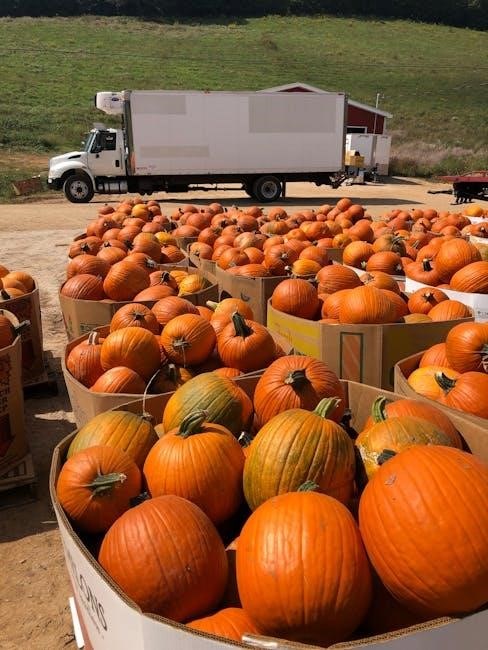The food truck industry in Illinois is thriving, offering diverse culinary options․ However, operating a food truck requires adherence to specific legal, safety, and environmental regulations to ensure smooth operations․
1․1 Overview of the Food Truck Industry in Illinois
The food truck industry in Illinois is vibrant, offering a diverse range of cuisines․ With a strong presence in urban areas like Chicago and smaller towns, food trucks cater to varying tastes and events, supported by a growing economy and cultural demand for mobile dining experiences․
1․2 Importance of Adhering to Regulations
Adhering to food truck regulations in Illinois is crucial for legal compliance, customer safety, and business success․ Proper licensing, health standards, and zoning adherence ensure smooth operations, avoid fines, and maintain customer trust․ Non-compliance can lead to penalties, reputational damage, and even business closure․ Following regulations fosters a safe environment and supports long-term sustainability in the competitive food truck industry․

Licensing and Permits
Operating a food truck in Illinois requires specific licenses and permits to ensure legal compliance․ These include food service, business, and vehicle permits, each with unique requirements․
2․1 Types of Licenses Needed
Food truck operators in Illinois must obtain a food service license, business license, and mobile food vendor license․ Additional permits like liquor licenses may be needed for alcohol sales․ Vehicle registration is also required․
2․2 Application Process and Costs
The application process involves submitting required documents, such as a business plan and menu, to the Illinois Department of Public Health․ Costs vary, with a base fee of $395 for a food service license․ Additional permits may increase the total expense․ Payments must be made upon approval, and fees are non-refundable․
Zoning and Location Restrictions
Zoning laws in Illinois dictate where food trucks can operate, with restrictions varying by city and rural areas to ensure public safety and business balance․
3․1 Restricted Areas for Food Trucks
Food trucks in Illinois are prohibited from operating near schools, hospitals, and residential zones․ Certain commercial areas also impose bans․ Additionally, parking within 100 feet of trash receptacles or near fire hydrants is restricted․ Local ordinances vary, so it’s crucial to verify restrictions before setting up․ Proximity to existing restaurants may also be regulated to prevent competition․ Always check local regulations to ensure compliance․
3․2 Obtaining Location Permits
To operate legally, food truck owners must secure location permits from local government offices․ Requirements include a valid business license, health department certification, and proof of insurance․ Additional fees may apply based on the location․ Permits often need renewal annually, ensuring compliance with local regulations․ Failure to obtain proper permits can result in fines or operational shutdown․ Always verify permit requirements before setting up your food truck․

Health and Safety Inspections
Regular inspections ensure food trucks meet Illinois health standards․ Maintain cleanliness, proper food temperature control, and dispose of waste correctly to pass inspections and protect public health․
4․1 Food Safety Standards
Illinois food trucks must comply with state food safety standards, including proper food handling, storage, and preparation practices․ Adhere to the Illinois Food Code, ensure clean facilities, and maintain handwashing stations․ Regularly sanitize equipment, store food at correct temperatures, and dispose of waste properly to prevent contamination and foodborne illnesses․
4․2 Inspection Process and Frequency
Food trucks in Illinois undergo regular inspections by local health departments to ensure compliance with food safety standards․ Inspections are conducted annually, with additional checks during special events․ Trucks are evaluated for cleanliness, proper food storage, and handling practices․ Failure to meet standards can result in penalties or closure․ Consistent compliance is crucial for maintaining operational permits and public trust․

Equipment and Vehicle Requirements
Food trucks in Illinois must meet specific equipment and vehicle standards, including commercial-grade appliances, proper ventilation, and safety features․ Trucks must also pass annual inspections․

5․1 Food Preparation and Storage Equipment
Food trucks must be equipped with commercial-grade appliances, including refrigerators, freezers, and cooking equipment․ Proper ventilation and fire suppression systems are mandatory․ Storage areas must be sealed and pest-proof․
All equipment must meet Illinois health codes and be subject to regular inspections․ Food preparation surfaces must be made of durable, easy-to-clean materials to ensure hygiene and safety standards․
5․2 Vehicle Registration and Inspection
Food trucks must undergo annual vehicle registration through the Illinois Secretary of State․ Regular safety inspections are required to ensure brakes, tires, and lights are functional․ Health inspections focus on food preparation areas to maintain sanitation standards․ Failure to comply can result in penalties or shutdown․ Proper registration and inspections are critical for legal operation and customer trust․
Parking and Operational Guidelines
Operating a food truck in Illinois requires adherence to specific parking and operational regulations to ensure public safety and fair business practices․ These guidelines include restrictions on parking in certain zones, obtaining necessary permits, and complying with designated operational hours․ Food truck owners must also maintain access for emergency vehicles and follow local ordinances to avoid penalties․
6․1 Parking Restrictions and Regulations
Parking restrictions in Illinois ensure food trucks operate safely and fairly; Prohibited areas include near schools, hospitals, and residential zones․ Time limits and specific permits are often required․ Enforcement includes fines or relocation․ These rules aim to maintain public safety, manage traffic flow, and prevent unfair competition․ Adhering to these regulations is essential for smooth operations․
6․2 Hours of Operation and Special Events
Food trucks in Illinois must adhere to specific hours of operation, typically restricted during late-night or early-morning hours in certain areas․ Special events like festivals or concerts may require additional permits and have unique operating guidelines․ Local ordinances vary, so it’s crucial to check with authorities before setting up․ These rules ensure public safety and maintain order during peak times or large gatherings․

Insurance Requirements
Insurance is crucial for protecting your food truck business in Illinois․ Liability and property coverage are essential to safeguard against accidents, damages, and legal issues, ensuring compliance with state regulations․
7․1 Types of Insurance Needed
Food truck operators in Illinois must obtain general liability insurance to cover accidents or injuries․ Commercial property insurance protects the truck and equipment․ Auto liability insurance is required for vehicle-related incidents․ Workers’ compensation insurance is needed if hiring employees․ Additionally, food contamination insurance ensures protection against foodborne illness claims, safeguarding your business from potential financial losses․
7․2 Minimum Coverage Requirements
In Illinois, food truck owners must meet specific insurance coverage minimums․ General liability insurance typically requires at least $300,000 in coverage for bodily injury and property damage․ Commercial auto insurance must cover at least $25,000 per person and $50,000 per accident for bodily injury, plus $20,000 for property damage․ Property insurance should cover equipment and inventory, while workers’ compensation is mandatory for employees․ Ensure policies meet state standards to avoid penalties․
Environmental and Waste Management Regulations
Food trucks in Illinois must adhere to environmental rules, including proper waste disposal and recycling practices․ Sustainability standards ensure minimal ecological impact, aligning with state regulations․

8․1 Proper Waste Disposal Methods
Food trucks in Illinois must dispose of waste properly to maintain environmental health․ This includes using approved containers for food waste and recyclables․ Operators should separate trash, recyclables, and compostables․ Proper disposal prevents contamination and adheres to local regulations․ Regularly emptying waste containers and cleaning them is essential․ Non-compliance can result in fines and operational issues․ Proper waste management is crucial for sustainability and public health․
8․2 Recycling and Sustainability Practices
Food trucks in Illinois are encouraged to adopt eco-friendly practices․ Use recyclable materials for packaging and utensils․ Implement composting for food waste to reduce landfill contributions․ Conserve water and energy by using efficient equipment․ Train staff on sustainability practices to minimize environmental impact․ Illinois promotes green initiatives, and compliant food trucks may gain incentives or recognition, supporting both business and environmental goals effectively․
Starting a food truck in Illinois requires careful preparation and compliance with various regulations․ Ensure you obtain all necessary permits and stay informed on updates regularly․
9․1 Summary of Key Requirements
Operating a food truck in Illinois requires adherence to licensing, permits, health inspections, and equipment standards․ Parking restrictions, insurance, and waste management regulations must also be followed․ Understanding these requirements ensures compliance and helps maintain a successful food truck business․ Refer to official resources for detailed guidelines and updates․
9․2 Resources for Further Assistance
For detailed guidance, consult the Illinois Department of Public Health and local city councils․ Additional resources include the Illinois Small Business Development Center and the National Food Truck Association․ These organizations provide updated regulations, application forms, and best practices․ Visit their official websites or contact them directly for personalized support and compliance assurance․



